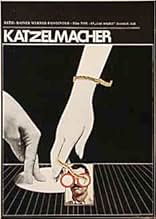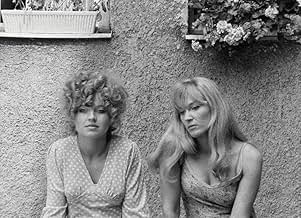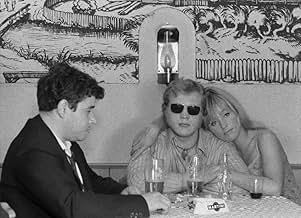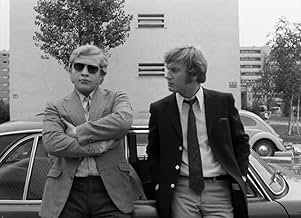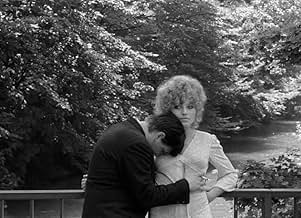Adicionar um enredo no seu idiomaJorgos, a migrant worker from Greece, joins a group of young people in Munich usually hanging around. This foreigner incites hostility and jealousy among them, and he is insulted as a "Commu... Ler tudoJorgos, a migrant worker from Greece, joins a group of young people in Munich usually hanging around. This foreigner incites hostility and jealousy among them, and he is insulted as a "Communist" and "Greek dog". After having been attacked, Jorgos talks to Maria of his wish to re... Ler tudoJorgos, a migrant worker from Greece, joins a group of young people in Munich usually hanging around. This foreigner incites hostility and jealousy among them, and he is insulted as a "Communist" and "Greek dog". After having been attacked, Jorgos talks to Maria of his wish to return home.
- Direção
- Roteirista
- Artistas
- Prêmios
- 8 vitórias e 2 indicações no total
Avaliações em destaque
Thus the film becomes an engrossing social commentary on prejudice and the effects of that and of jumping to conclusions. As well as taking an anti-gossip stand. The film would be a wonderful example in illustrating the events of any countries racial issues.
In may be demanding of the viewer though. The long shots and an hour of simple conversation and savage romance become tedious. Hanging on through the whole film though will be rewarding.
Money also plays an important role overall. Those who have money are more oppressive and dominating. As if having money gives one more of a right to tell your partner what he or she should do in things that have nothing to do with money. Two of the men consider doing something illegal, that should bring big bucks. This was the cause for some quarrels with their women who found the idea appealing but didn't want to risk it. We never learn what it was they had planned and eventually they dropped the idea. But the relationships with their women were hurt permanently by this dispute.
Everyone seemed to have sex with everyone (except the ugly woman), without being much of an issue, but hey, it was 1969. In fact, it only was an issue when one of the women demanded money for it. It made her a whore, but the other women doing it for free didn't make them whores. Except for maybe the woman who was said to have sex with the guest-worker from Greece.
The scenes of always two different characters walking, with the melancholic music I understood this way that the two people talk differently to each other when they are among themselves. Always more tender, no matter which two people it were. But once there are at least three people the dynamics change for the worse.
At the beginning I found the film quite alien, because of the apparent disjointness of the scenes, but the better I knew the characters the more drawn in I was and I soon started to get something out of most scenes. It was also alien because I was not used to the way they talk. Pretty stagy in pronunciation and phrasing. This could possibly be contributed to the fact that the cast and writer/director Fassbinder all came from theater with little film experience at that point.
There was no sense of time. It just goes from one conversation to another. From the dialogue you could gather that a lot of time passed overall, but it isn't really important to know how much. It was just important for the movie so to not have the plot stagnating, to see different sides of the characters. Although it could also be argued again that you don't get a sense of time passing because Fassbinder didn't yet know any better, since he was rather new to the medium of film.
It's tough to fully recall why the group turns on this Greek guy - maybe he said something or did something that made them turn, or it was his funny accent or way of speaking (I certainly remember the latter as it was one of those things that stuck out) - but the point is clear. Alienation drives so many of Fassbinder's story, and it's not simply the characters but the style itself here that gives off an alienating vibe. We see many shots that are just static on these guys (Fassbinder being one of them in the cast) hanging around, sitting down, smoking, talking, aimless, and then it'll cut to a shot of two women walking and talking in an apartment complex, and these are the only shots where music comes up (the same tinny piano music, by the way). It's in this atmosphere, in black and white no less, that things that look AND feel the same all the time can get disrupted by just one character.
I don't know if this is really among the director's best, and it's best I think to look at it as an early experiment. Certainly things he's dealing with here he'd explore throughout the rest of his career. It's not particularly engaging in the way of A-B-C unfold. You're just watching this very slow moving car wreck that's unfolding in a way that doesn't seem like it. Again, akin to one of those low-key character studies that would pop up in American independent cinema decades later. But it is interesting, for what it is, especially if you can be open to its intended aim of being *about* aimlessness and the way that underneath that is a lot of darkness.
Você sabia?
- CuriosidadesShot in nine days.
- Cenas durante ou pós-créditosEs ist besser neue Fehler zu machen, als die alten bis zur allgemeinen Bewußtlosigkeit zu konstituieren (Yaak Karsunke)
- ConexõesFeatured in Century of Cinema: Die Nacht der Regisseure (1995)
Principais escolhas
- How long is Katzelmacher?Fornecido pela Alexa
Detalhes
Bilheteria
- Orçamento
- DEM 80.000 (estimativa)
- Faturamento bruto nos EUA e Canadá
- US$ 8.144
- Fim de semana de estreia nos EUA e Canadá
- US$ 11.623
- 16 de fev. de 2003
- Faturamento bruto mundial
- US$ 8.158
- Tempo de duração
- 1 h 28 min(88 min)
- Cor
- Mixagem de som
- Proporção
- 1.37 : 1

